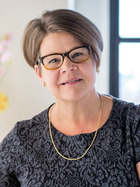- Q.
Can you recommend good resources and information about rhabdomyosarcoma? My niece was just diagnosed.
A.Rhabdomyosarcoma is a relatively rare form of cancer, but it is the most common type of soft tissue sarcoma in children. It is most common in children ages one to five, and is also found in teens aged 15 to 19, although this is more rare. This cancer can also occur in adulthood but that incidence is rarer still. Rhabdomyosarcoma can begin in many places in the body. However, it is most present in areas such as the head, neck and genitourinary tract. Its two most common forms are embryonal rhabdomyosarcoma and alveolar rhabdomyosarcoma.
Treatment recommendations are based on the stage of the cancer and whether all the cancer was removed by surgery. Treatments include surgery, radiation therapy and chemotherapy. It is also recommended that those with rhabdomyosarcoma have their treatment planned by a team of health care providers who are experts in their field.
When seeking sources of information online, it is important to visit websites that are reliable and up-to-date. The National Cancer Institute is a terrific resource, as is the Sarcoma Alliance. Cancer.net is a patient-friendly website from the American Society of Clinical Oncology.
- Q.
A family member has been diagnosed and I think she should see someone who specializes in treating sarcoma (I don't think this is currently the case). Do you know where I can find that information? Also, do you offer a support group for people with sarcoma?
A.You raise an important question regarding the importance of specialized expertise in the diagnosis and treatment of sarcoma, which is a cancer of the bone or connective tissues, including bone, fat, muscle, blood vessels, nerves, deep skin tissue and cartilage.
Because sarcoma is rare, there is an initial challenge of determining which bone and soft-tissue tumors are sarcomas and which are benign (not cancerous). That is why it is important, wherever possible, to seek advice at sarcoma treatment centers. Experts at these centers have the latest information and important experience in diagnosing and treating this type of cancer. A list of some of these centers can be found on the Sarcoma Alliance website, www.sarcomaalliance.org. Your doctor may also be able to refer you to a nearby sarcoma treatment center.
The Sarcoma Alliance offers list of support groups. At this time, CancerCare does not offer a support group for people with sarcoma, but anyone affected by sarcoma can join one of our other cancer-related groups, including those for young adults and caregivers. You can find all of CancerCare’s sarcoma-related resources, including workshops and publications, on our website.

 Answered by
Answered by